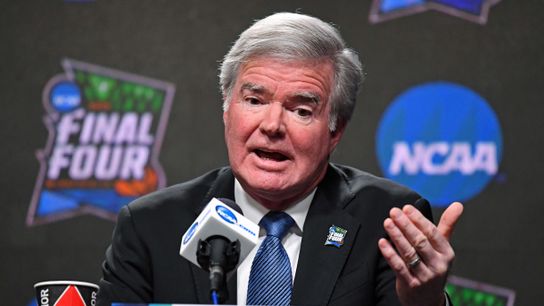Mark Emmert, the oft-embattled veteran leader of the NCAA, has just a year left atop college athletics' top governing body.
On Tuesday afternoon, NCAA Board of Governors Chair John J. DeGioia announced via press release that Emmert and the NCAA's top board had reached "mutual agreement" for Emmert to step down in little more than a year.
Emmert has helmed the NCAA since 2010; his term will expire just before he completes a full 13th year atop the Indianapolis-based organization.
"Throughout my tenure, I've emphasized the need to focus on the experience and priorities of student-athletes," Emmert said in a statement. "I am extremely proud of the work of the Association over the last 12 years and especially pleased with the hard work and dedication of the national office staff here in Indianapolis."
Emmert's time atop the NCAA has been marked by no shortage of controversies, including most recently the discrepancy of amenities and facilities during the 2021 Men's and Women's NCAA Tournaments, which were hosted at single-site locations as the United States in general and college athletics specifically continued to work back from the COVID-19 pandemic lockdowns.
Additionally, a year ago -- as college football's top level, the Football Bowls Subdivision -- worked an an effort to expand its College Football Playoff, the summer was spent with news of impending drastic realignments in powerhouse athletics conferences as well as the onset of the new Name, Image & LIkeness era that has allowed student-athletes to monetize their personal brands.
Per the NCAA's release, the organization stated "NCAA member schools adopted a new constitution in January and are in the process of transforming the structure and mission to meet future needs."
"With the significant transitions underway within college sports," DeGioia said in his statement, "the timing of this decision provides the Association with consistent leadership during the coming months plus the opportunity to consider what will be the future role of the (NCAA) president.
"It also allows for the selection and recruitment of the next president without disruption."
